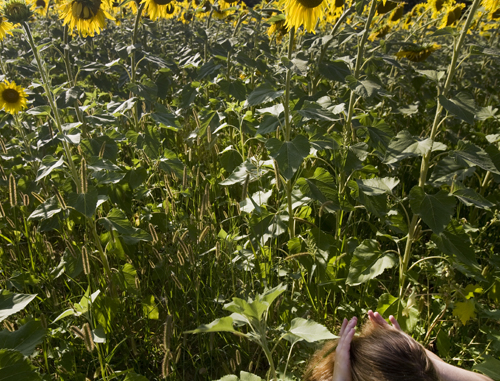 Davy has a scar on her forehead, just off center, as though it marks the edge of a third eye. All this third-grade year she has been telling us her history week by week. She’s been saying that soon she will get to the part where she acquires the scar. It’s Friday and we surround her, bunched into a crescent on the tan reading area carpet.
Davy has a scar on her forehead, just off center, as though it marks the edge of a third eye. All this third-grade year she has been telling us her history week by week. She’s been saying that soon she will get to the part where she acquires the scar. It’s Friday and we surround her, bunched into a crescent on the tan reading area carpet.
“You were still in the jungle,” Jefferson calls out. No one ever raises hands in her class but if she snaps, we listen. Davy’s story started when she, a new teacher, fled her home in Phnom Penh. With her family, she crossed a river and mine fields. She has been telling us the part in the jungle, where they sleep in trees during the day and move slowly toward the northern border at night.
“No, after you got captured,” says Kazuaki.
Davy’s black hair cascades down her back for an instant before she smooths it back. She twists it into a thick knot and pokes it through with a jewel-studded hair stick. “There were four soldiers. I couldn’t tell how many of my family they had taken. They tied me, standing, to a tree.” As she speaks I watch her lips, which are always darkened red. I can’t imagine being as beautiful as she is. “They tied up my children so they could see me, but I couldn’t see them.”
Throughout this year she is teaching us Cambodian dance. There will be an evening in late May when she will dress us in bright silk wraps and spray our hair stiff and black. We will perform our choreography, undulating our hands, soft and snakelike as she has taught us, for our parents in the Stevens Elementary lunchroom auditorium.
“The soldier tried to take this off,” she says, holding up her wrist, her jade bracelet shifting an inch lower. “He kept slamming it with the end of his gun but it wouldn’t break. They threw knives at me, at my eyes, like darts.” She traces the scar.
“They got you?” Summer asks.
It is the year I first lie awake in bed, knees curled up inside my nightgown. Sometimes I sit up, pull the white curtain away from the window above my bed, and peek at the sky. I think it is strange, not that people can die, but that they can be alive.
“My children were yelling for me. They took me away from the tree and put me into a hole in the ground. My hands and my feet were tied. They started throwing dirt on me. It was in my nose and mouth.”
She stops and we harangue for more, please-ing, scooting across the rug to be close to her.
“No, it’s enough.” She walks to the board and picks up a nub of chalk. “We are going to do multiplication.”
We linger at the carpet, thinking she won’t continue but still hoping. “How did you get out?” Isabel asks.
“Next week,” Davy says. She traces numbers on the board for long multiplication.
We trudge to our desks.
“We’re going to do it the Cambodian way,” she says.
From my desk, I watch the bracelet move as she writes. It is polished green with clouds of white. At the beginning of the school year I had huddled next to her, trying to find the bracelet’s clasp. “They are given to all Cambodian girls on their thirteenth birthdays,” she said then. I touched it, wanting one, my wrist small next to hers. “You wear it your whole life. As you grow your wrist grows into it.”
Almost two decades later I will find a newspaper article that mentions Davy. It will provide slim details of her life in the years that have elapsed and only snippets of her history. During her flight from Cambodia, the article says, two of her four children, her father, husband, sister, and two of her four brothers were killed. Remembering her stories, that it was her brother who dug her out when she was buried alive, I will be surprised by the way I am longing to see her. I will imagine her still at the blackboard, stitching up her hair. I will wonder if she considered the sum of her stories over the course of our lives when she told us Cambodian multiplication was different.
—
Rachel Smith directed the documentary film MINUSTAH Steals Goats. She was a Copper Nickel finalist in fiction in 2010 and is currently a graduate candidate in the MFA program at the University of Mississippi.
Photo by Annie Agnone
